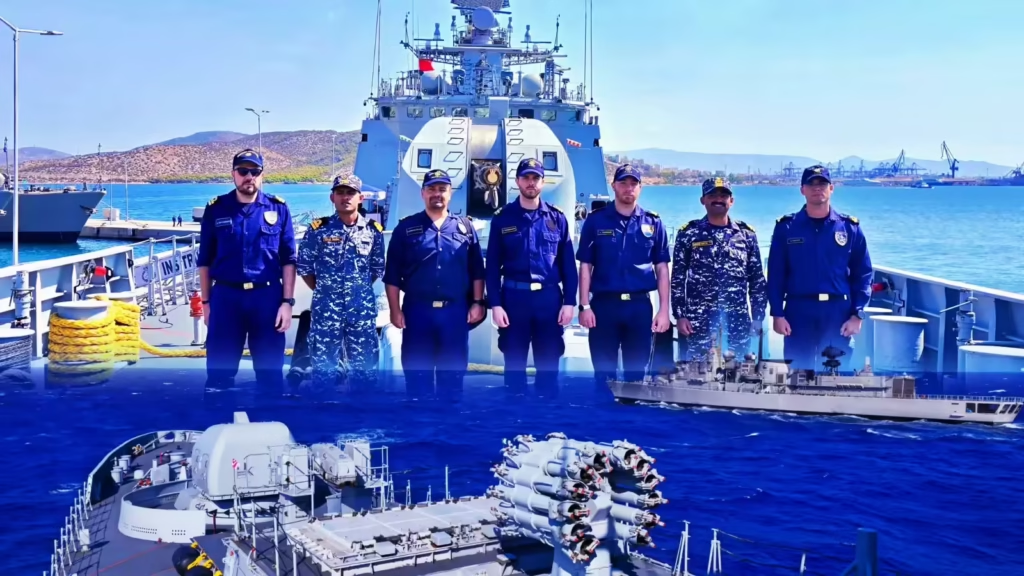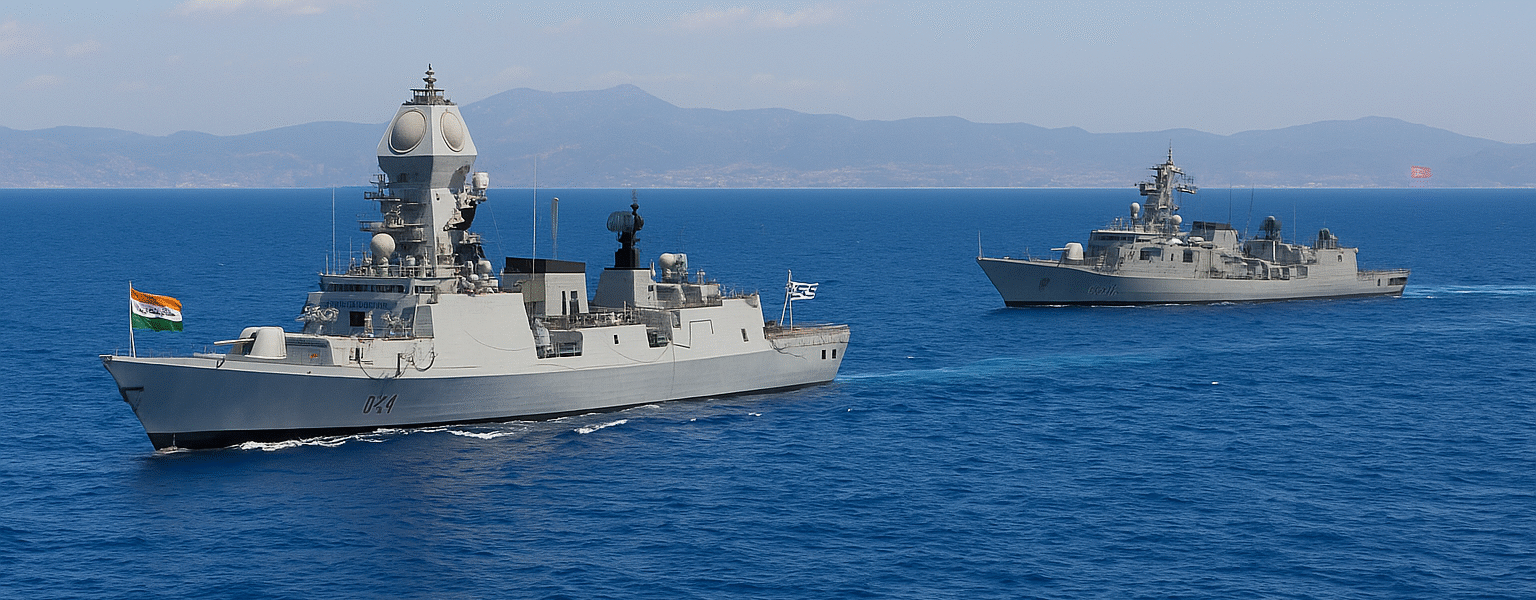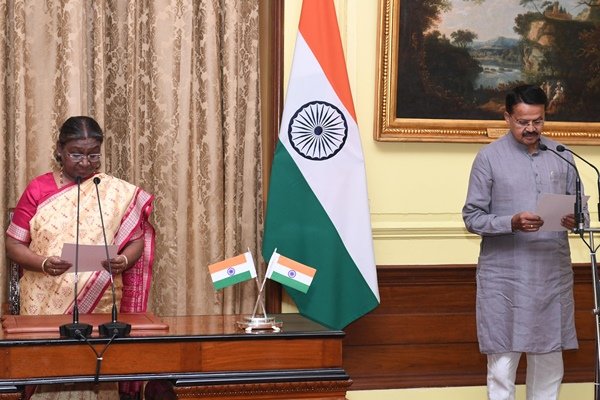India Greece Naval Exercise in the Mediterranean Sends Strong Message to Turkey
Introduction
The calm waters of the Bhoomadhya Sagar (Mediterranean Sea) have turned into a theatre of geopolitical contest, as India and Greece conducted joint naval exercises (India Greece Naval Exercise) this week. The move, hailed as a deepening of defence and strategic cooperation between New Delhi and Athens, has prompted sharp reactions from Turkey, which demanded India withdraw its ship. But India’s firm stance—that it will not recall its naval deployment—signals not just a strengthening bilateral bond but also a strategic assertion in a historically contested region.
The India Greece Naval Exercise: India–Greece Defence Synergy

The ongoing India Greece Naval Exercise marks the latest chapter in India’s expanding naval diplomacy. The drills include coordinated patrols, anti-submarine warfare simulations, and air–sea operational integration. For Greece, the partnership with India strengthens its own security calculus in the Eastern Mediterranean, where it faces off against Turkey over territorial and maritime disputes.
India’s presence, far from its own waters, underscores New Delhi’s growing naval reach and its intent to protect trade and maritime routes connecting Asia to Europe.
Turkey’s Objections to India Greece Naval Exercise: An Old Rivalry Rekindled
Turkey, long seen as a critical player in the Mediterranean, reacted with hostility. Ankara officially called on New Delhi to “withdraw the ship immediately,” framing India’s presence as provocative.
Turkey’s Broader Agenda:
- Champion of Political Islam: Under President Erdoğan, Turkey has positioned itself as a voice for the Muslim Brotherhood and Islamic radicals across the Arab world, often at odds with India’s interests.
- Kashmir Posture: Turkey has consistently criticised India’s internal policies, especially on Kashmir, aligning itself with Pakistan diplomatically.
- Regional Ambition: Turkey seeks to be the undisputed leader of the Arab and Islamic world, a goal threatened by India’s growing influence in West Asia.
India’s refusal to bow to Turkish pressure, therefore, serves as a pointed message: Bharat will defend its sovereign decisions and extend its influence even in regions where Turkey traditionally wields leverage.
The Geopolitical Angle: Why India in the Mediterranean?
India Greece Naval Exercise drills in Europe’s southern flank is more than symbolic. It strengthens New Delhi’s strategic play on several fronts:
- Countering Turkish Hostility: By exercising with Greece, Turkey’s rival, India asserts itself in a sensitive theatre, balancing Ankara’s anti-India rhetoric.
- Securing Maritime Routes: The Mediterranean is a vital link in India’s trade corridor to Europe. Naval presence reassures Indian businesses and signals that New Delhi will safeguard its commercial lifelines.
- Expanding Strategic Partnerships: Greece is becoming a critical partner for India, not only in defence but also in energy and connectivity projects, particularly as Europe looks for alternatives beyond Turkey.
- Global Naval Projection: This exercise demonstrates India’s ability to operate far beyond the Indian Ocean, bolstering its claim as a rising maritime power in Asia and beyond.
Global Toolkits & Geopolitical Disruptions: India in the Crosshairs
A Strong Message from Bharat
The continuation of the India Greece Naval Exercise, despite Turkish objections, highlights India’s new strategic confidence. It is no longer content with a regional role but is now prepared to project power globally when its interests or its allies are at stake.
For Turkey, this is a reminder that its attempts to lead the Islamic world and challenge India on ideological grounds will not go unanswered. For the wider world, it is evidence that India’s rise as a naval and geopolitical power is not a distant projection—it is happening here and now, even in the contested waters of the Mediterranean.
Conclusion
The India Greece naval exercise may appear as just another bilateral drill, but its symbolism reverberates across three continents. For Europe, it is a reassurance of India’s commitment to shared security. For West Asia, it is a pushback against Turkey’s Islamist ambitions. And for India itself, it is a declaration: Bharat is no longer a bystander but a key player in the global maritime order.
As conflicts rage in Ukraine and the Middle East, this assertive move by India shows that the balance of power in the 21st century will not be dictated solely by Western capitals or traditional regional powers. A new Asian force is making its mark—and Turkey has taken notice.
Rising Geopolitical Tensions: Islamic Radicalism, Refugee Crisis, and the Shifting Global Order
India Greece naval exercise, India Turkey naval tensions, Indian Navy Mediterranean deployment, Greece Turkey maritime disputes, India defence diplomacy Europe, Turkey response to India navy, Bharat rising naval power, Indian Navy in Bhoomadhya Sagar, Indo-Greek strategic partnership, India Mediterranean business routes,Turkey India rivalry geopolitics, Indian Navy warship Greece exercise, India maritime security Mediterranean, Greece defence ties with India, Turkey objections Indian navy drill, India naval power projection, Bharat strategic rise in Asia, India global maritime order
#Geopolitics #WorldNews #GlobalSecurity #DefenceNews #IndiaRising #IndianNavy #Greece #Turkey #NavalExercise #Mediterranean #StrategicPartnership #BreakingNews #MaritimeSecurity #AsiaPower #BharatOnRise
Discover more from
Subscribe to get the latest posts sent to your email.











1 COMMENTS